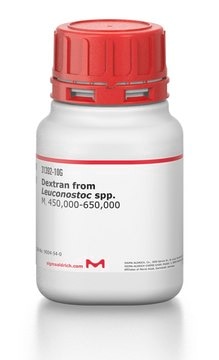31417
Dextran from Leuconostoc mesenteroides
analytical standard, for GPC, Mw 5,000
Synonym(s):
Dextran Ladder
About This Item
Recommended Products
grade
analytical standard
for GPC
Quality Level
mol wt
Mn ~3,300
Mp ~4,400
Mw ~5,200
analyte chemical class(es)
oligosaccharides
technique(s)
gel permeation chromatography (GPC): suitable
Mw/Mn
~1.58
application(s)
food and beverages
format
neat
InChI
1S/C18H32O16/c19-1-5(21)9(23)10(24)6(22)3-31-17-16(30)14(28)12(26)8(34-17)4-32-18-15(29)13(27)11(25)7(2-20)33-18/h1,5-18,20-30H,2-4H2
InChI key
FZWBNHMXJMCXLU-UHFFFAOYSA-N
Looking for similar products? Visit Product Comparison Guide
Related Categories
General description
Dextran from Leuconostoc mesenteroides (Mw: 5000) may be used as an analytical standard to calibrate the column for gel permeation chromatography (GPC).
Application
Storage Class
11 - Combustible Solids
wgk_germany
WGK 2
flash_point_f
Not applicable
flash_point_c
Not applicable
ppe
Eyeshields, Gloves, type N95 (US)
Choose from one of the most recent versions:
Certificates of Analysis (COA)
Sorry, we don't have COAs for this product available online at this time.
If you need assistance, please contact Customer Support.
Already Own This Product?
Find documentation for the products that you have recently purchased in the Document Library.
Customers Also Viewed
Protocols
A step-by-step protocol for released N-linked glycan analysis of the monoclonal antibody adalimumab, based on UHPLC-FLR-MS and procainamide labeling.
Related Content
Learn about C6H10O6 or dextran formation, classes and naming from MilliporeSigma. Dextrans are polysaccharides with molecular weights ≥1,000 Dalton, which have a linear backbone of α-linked d-glucopyranosyl repeating units.
Our team of scientists has experience in all areas of research including Life Science, Material Science, Chemical Synthesis, Chromatography, Analytical and many others.
Contact Technical Service


